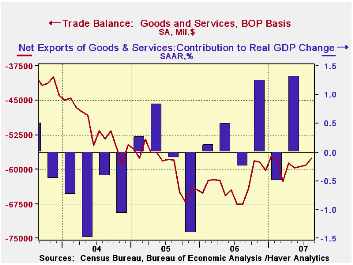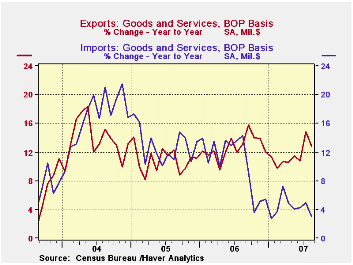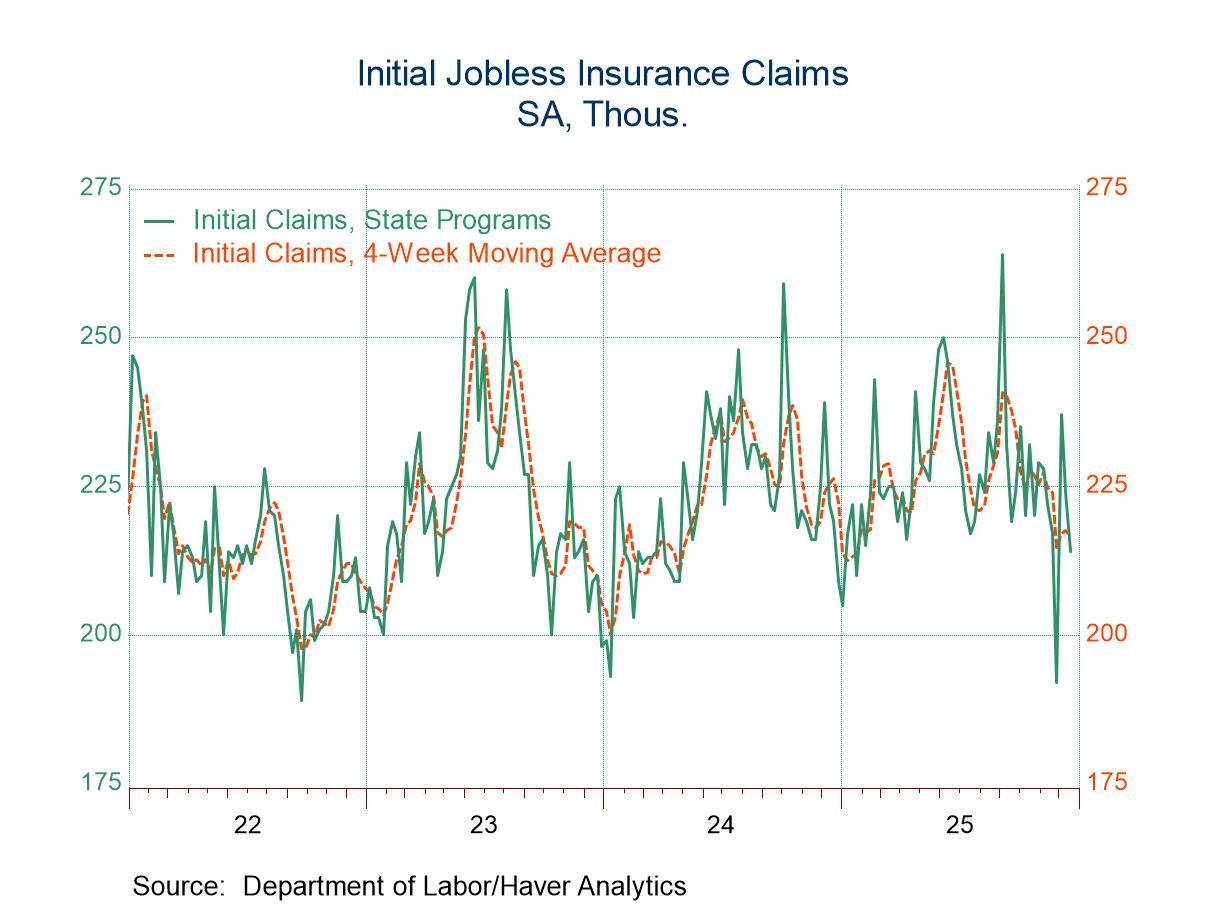 Global| Oct 11 2007
Global| Oct 11 2007U.S. August Trade Deficit Smallest Since January
by:Tom Moeller
|in:Economy in Brief
Summary
The U.S. foreign trade deficit in August narrowed very slightly to $57.6B from $59.0B in July which was revised slightly shallower from the initial report. The August deficit was below Consensus expectations for a deficit of $58.7B. [...]

The U.S. foreign trade deficit in August narrowed very slightly to $57.6B from $59.0B in July which was revised slightly shallower from the initial report. The August deficit was below Consensus expectations for a deficit of $58.7B.
The August deficit was the lowest since January and the average deficit of $59.0B during the last eight months compares to an average of $64.7B during the first eight months of 2006.
U.S. exports rose just 0.4%, the smallest monthly increase since April.
Exports of goods rose 0.4% (13.3% y/y) though exports of capital goods fell 0.6% ( +9.9% y/y). Exports of advanced technology goods exports rose 4.8% (8.9% y/y) and recouped most of the prior month's 8.6% drop. Exports of autos & products fell 8.4% (+10.3% y/y) after a 14.5% surge during July. Exports of nonauto consumer goods worked the other way and rose 1.5% (12.9% y/y) while exports of foods, feeds & beverages surged 8.7% (26.2% y/y).
U.S. exports of services rose 0.6% (11.8% y/y) after a slight slip during July. The modest increase came as exports of travel surged 2.0% (14.8% y/y) and passenger fares also surged by 2.0% (11.7% y/y).
Overall imports fell 0.4% though imports of petroleum products rose 4.4% (-3.0% y/y) as the price per barrel of crude petroleum rose 3.9% (3.0% y/y). Imports of nonauto consumer goods fell 0.5% (+5.1% y/y) though capital goods imports rose 0.9% (+3.4% y/y). Imports of advanced technology products made up all of the prior month's decline and rose 3.1% (12.1% y/y).
The U.S. trade deficit in goods with China improved slightly m/m to $22.5B versus a deficit of $22.0B the during August of '06.
International Trade: Why We Don’t Have More of It from the Federal Reserve Bank of Philadelphia is available here.
Is the United States Losing Its Productivity Advantage? from the Federal Reserve Bank of New York can be found here.
| Foreign Trade | August | July | Y/Y | 2006 | 2005 | 2004 |
|---|---|---|---|---|---|---|
| U.S. Trade Deficit | $57.6B | $59.0B | $67.6B (8/06) |
$758.5 | $714.4B | $612.1B |
| Exports - Goods & Services | 0.4% | 2.7% | 12.8% | 12.7% | 10.9% | 13.7% |
| Imports - Goods & Services | -0.4% | 1.7% | 3.0% | 10.4% | 12.9% | 16.8% |
Tom Moeller
AuthorMore in Author Profile »Prior to joining Haver Analytics in 2000, Mr. Moeller worked as the Economist at Chancellor Capital Management from 1985 to 1999. There, he developed comprehensive economic forecasts and interpreted economic data for equity and fixed income portfolio managers. Also at Chancellor, Mr. Moeller worked as an equity analyst and was responsible for researching and rating companies in the economically sensitive automobile and housing industries for investment in Chancellor’s equity portfolio. Prior to joining Chancellor, Mr. Moeller was an Economist at Citibank from 1979 to 1984. He also analyzed pricing behavior in the metals industry for the Council on Wage and Price Stability in Washington, D.C. In 1999, Mr. Moeller received the award for most accurate forecast from the Forecasters' Club of New York. From 1990 to 1992 he was President of the New York Association for Business Economists. Mr. Moeller earned an M.B.A. in Finance from Fordham University, where he graduated in 1987. He holds a Bachelor of Arts in Economics from George Washington University.






